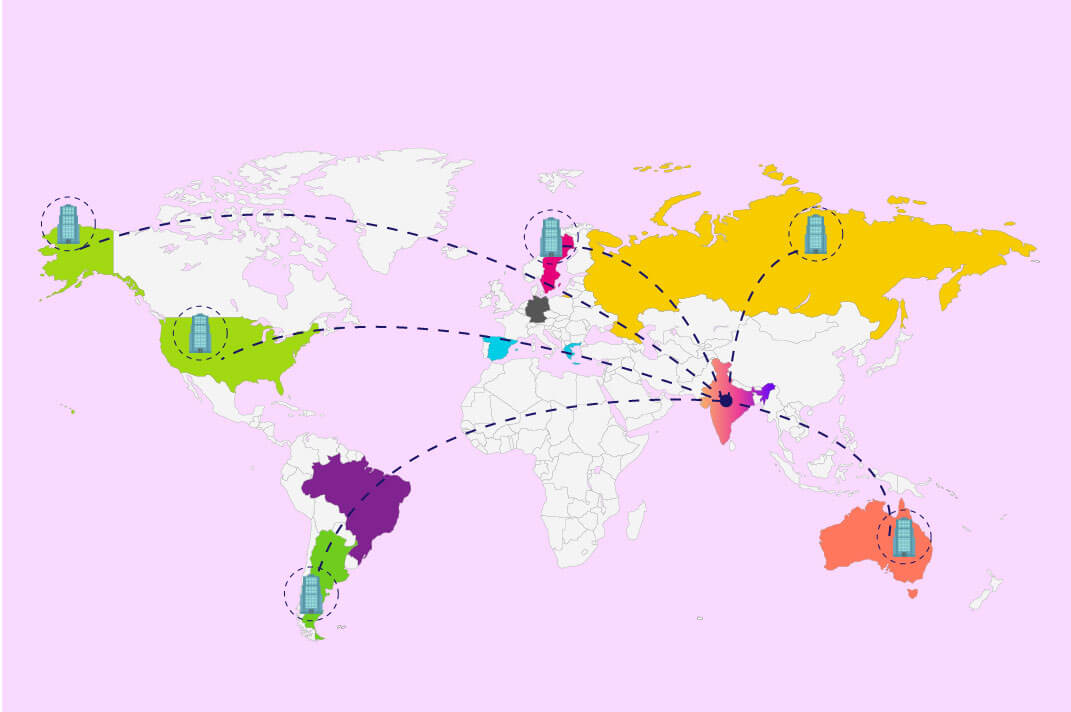 Tiered Link Strategy – Multiply Your SEO Impact Today!
Tiered Link Strategy – Multiply Your SEO Impact Today!
Shared Services: A New Opportunity With Employer of Record
Written by kiran » Updated on: November 08th, 2024
Shared services are one of the well-established business models widely used across various businesses. Initially started as a concept to support back-office functions such as payroll & accounting, the model has evolved significantly. Technology advancements in the information technology (IT) and telecommunication sectors are crucial in shaping the services as a robust service model.
Today, you must have seen that shared services are available for several business functions, like human resources (HR), finance, IT, personal training, and procurement. This service scope expansion is possible due to technological innovations, like the Internet of Things (IoT), Machine Learning (ML), Artificial Intelligence (AI), etc. As a result, communications and automation processes, which represent core aspects of the services, are easily streamlined using enterprise resource planning (ERP) systems and other integrated software solutions.
In this blog, we’ve explained new opportunities for shared services or shared service centers (SSCs) using the most economical employment model, i.e., employer of record (EOR). Also, you’ll learn about the advantages of choosing the right locations for your SSCs by giving India as an example. Before we dive into these two points, let’s briefly revisit the meaning and some key aspects of shared services to get a good perspective regarding the uniqueness of the business model.

Shared Services: Meanings and Key Aspects
Several industries ranging from manufacturing to e-commerce often rely on shared service providers for various reasons. Most back office or non-core business functions across sectors can be effectively streamlined using shared service centers. Here are the insights of key business functions primarily used for setting up SSCs.
shared service center
IT Services
IT shared service centers can effectively handle support services including helpdesk support, application development, network management, and cybersecurity & infrastructure management. You can leverage economies of scale in handling hardware or software purchases using a single point of contact. SSCs are the most effective way to provide unified service support and service delivery enhancement related to the IT industry.
Accounting & Finance
Several functions related to accounting and finance, such as financial reporting, accounts payable and accounts receivable, budgeting, and taxes can be easily streamlined using SSCs. With standardized processes, you can exercise better control over financial processes and ensure the accuracy of services related to accounting and finance.
Human Resources Management
Various HR-related functions, like talent acquisition, payroll, employee records management, benefits administration, and personal training can be handled through shared services. You can ensure consistent employee experience by providing uniform HR support and policies.
Sourcing & Procurement
Vendor management, bulk purchasing, and supplier & contract management are major services conducted using shared service centers. Centralized procurement ensures better negotiations in bulk purchasing, transparency, and effective tracking of suppliers.
Logistics & Supply Chain Management
Using SSCs, you can ensure better inventory management, optimized logistics support, warehousing, and supply chain visibility. With centralized processes, you can reduce costs and optimize logistics & supply chain management with better coordination and efficiency.
Digital Marketing
Content creation, distribution, and promotion through various social media platforms can be streamlined using SSCs. With centralized campaign management, SSCs enhance content creation, optimize SEO/SEM strategies, and unify social media efforts. Using integrated analytics and standardized reporting, you can conduct a comprehensive performance analysis and improve the efficiency of the digital marketing team.
Data Analytics
Using centralized data warehouses, SSCs ensure consistency and compliance fulfillment in data collection and management. SSCs help improve decision-making and strategic planning by pooling specialized analytical expertise and advanced tools like AI, ML, etc. You can ensure a holistic yet cross-functional insight by implementing standardized governance of predictive analytics, reporting and dashboards, and data integration.
RD & Engineering
You can foster innovation and competitive differentiation by centralized R&D facilities and engineering support. Using collaborative platforms and tools, SSCs ensure effective management of R&D projects and engineering services.
Customer Services
You can set up shared service centers for various customer services, like call center operations, customer relationship management, and support services. Having centralized customer service support is key to better customer experience and it can handle their needs effectively.
India: A Key Destination for Shared Service

India has been one of the key destinations for setting up shared service centers for years due to its unique opportunities. Cost efficiency and talent availability are key factors that drive global companies to establish SSCs in the country. Amazon, American Express, Thomson Financial, Siemens, GE, Marriott, British Airways, Citigroup, HSBC, Bank of America, Barclays, Deloitte, AT&T, Compaq, Ford, Ericson, Cigna, Lucent, and Dell are major companies having shared service centers in India. The country has a large English-speaking population and its geographical location provides 24/7 service support, making it a global hub for customer service centers. Let’s elaborate on some key factors that present favorable business environments for shared services in India.
shared services in India
Talent Availability
Once you decide on the location, finding the right talent or highly skilled workforce is key to a successful SSC setup. India has a vast talent pool with professional skills across various industries, such as IT, banking & finance, healthcare & pharmaceutical, human resources, engineering & architecture, and customer care services. Most Indian professionals speak and communicate in English, which makes it easier for global companies to set up SSCs in the country. International clients and company stakeholders can easily connect with Indian talent due to their language proficiency.
Low Operational Cost
Hiring costs of Indian professionals are affordable and quite lower compared to Western countries. Also, except for some major metropolitan areas like Mumbai and Delhi, the costs of setting up and maintaining an office in major Indian cities are cheaper than in major global cities. Additionally, the Indian government provides a range of incentives, such as subsidies and tax breaks to foreign companies establishing SSCs in the country. These are key reasons for reducing the overall operational costs of having shared services in India.
Economic and Political Stability
With impressive economic growth and a stable political climate, India creates a stable and favorable business environment for global companies. Being one of the fastest-growing economies globally, the country provides a stable environment for long-term business planning and attracts foreign investment. Considering its robust banking and financial systems, India emerged as the preferred destination for finance-shared services and a haven for business operations despite fear of global economic uncertainty and escalating geopolitical tensions. India’s friendly relations and existing international trade agreements with major global economies make it easier for global companies to start providing services.
Unique Opportunities of Using EOR for Shared Services in India
Global businesses often outsource to third-party experts or form a subsidiary company to get shared services done. Compared to business models like outsourcing and subsidiary incorporation, Employer of record or EOR is a relatively new model in India that offers the most economical employment arrangement.
EOR offers unique benefits for global businesses having multiple operational units across diverse geographical locations. Unlike outsourcing, an EOR builds a new team of experts related to your service requirements and ensures you better control and management over your team.
When using EOR services, you don’t need to form a subsidiary company for your services operation and avoid the fund blockage required in subsidiary incorporation. Also, you don’t require upfront capital investment to work with an EOR partner. Here are the insights of EOR’s unique offerings for businesses planning to establish shared services in India.
Recruitment
Hiring a remote workforce with the right talent for shared services in India can be daunting and time-consuming. EORs have a deep knowledge of the local job market, employment practices, and cultural nuances of hiring Indian talent. EORs have established networks and follow a streamlined recruitment process that reduces the time and effort involved in hiring new employees. Your EOR partner takes full responsibility for handling recruitment by scouting, shortlisting, and interviewing potential candidates for onboarding.
Compliance Assurance
Navigating regulatory compliance when establishing an SSC in a foreign jurisdiction like India can be challenging for global businesses. You must ensure that all employment practices and service operations comply with the local laws and regulations. However, this comes easy when you’ve got an EOR partner as EORs take sole responsibility for handling compliance matters, such as tax and payroll compliance on your behalf. EORs have a dedicated legal team that keeps abreast of new updates in local labor laws and employment regulations. With EOR support, you can operate your service with minimal legal and compliance risks.
Payroll & Employee Benefits Administration
Handling the payroll and benefits for your employees in India comes easy with EOR services support. EORs handle payroll processing and taxation for your team in compliance with local laws and regulations to ensure employees receive their monthly salary on time. Also, EORs offer competitive benefits packages, including medical benefits, health insurance, retirement plans, and other incentives, etc. for the employees to ensure job satisfaction and retention CONTINUE READING
Disclaimer: We do not promote, endorse, or advertise betting, gambling, casinos, or any related activities. Any engagement in such activities is at your own risk, and we hold no responsibility for any financial or personal losses incurred. Our platform is a publisher only and does not claim ownership of any content, links, or images unless explicitly stated. We do not create, verify, or guarantee the accuracy, legality, or originality of third-party content. Content may be contributed by guest authors or sponsored, and we assume no liability for its authenticity or any consequences arising from its use. If you believe any content or images infringe on your copyright, please contact us at [email protected] for immediate removal.
Copyright © 2019-2025 IndiBlogHub.com. All rights reserved. Hosted on DigitalOcean for fast, reliable performance.






